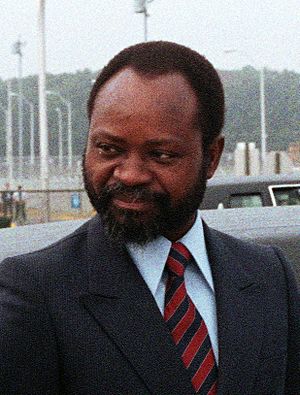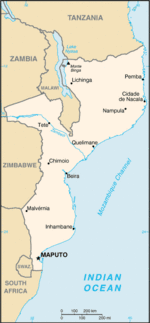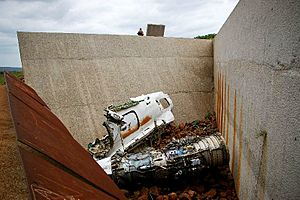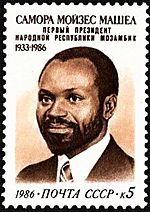Samora Machel facts for kids
Quick facts for kids
Samora Machel
|
|
|---|---|

Machel in 1985
|
|
| 1st President of Mozambique | |
| In office 25 June 1975 – 19 October 1986 |
|
| Prime Minister | Mário da Graça Machungo (Jul–Oct 1986) |
| Preceded by | Office established |
| Succeeded by | Joaquim Chissano |
| President of the Mozambique Liberation Front | |
| In office 14 May 1970 – 19 October 1986 |
|
| Vice President | Marcelino dos Santos (1970–1977) |
| Preceded by | Eduardo Mondlane |
| Succeeded by | Joaquim Chissano |
| Personal details | |
| Born |
Samora Moisés Machel
29 September 1933 Gaza Province, Portuguese Mozambique |
| Died | 19 October 1986 (aged 53) Mbuzini, Transvaal, South Africa |
| Political party | FRELIMO |
| Spouses | |
| Children | 8 including Josina |
Samora Moisés Machel (born September 29, 1933 – died October 19, 1986) was a brave Mozambican military leader and politician. He believed in socialist ideas. He became the first President of Mozambique when the country gained its independence in 1975.
Machel passed away in 1986 while still in office. His presidential plane crashed near the border between Mozambique and South Africa.
Contents
Early Life and Education
Samora Machel was born in a village called Madragoa, which is now known as Chilembene. This village is in Gaza Province, Mozambique. His family were farmers. Under Portuguese rule, his father faced unfair treatment. He had to sell his crops for less money than white farmers. He was also forced to grow cotton, which took time away from growing food for his family.
Despite these challenges, Machel's father was a successful farmer. By 1940, he owned many plows and cattle. Samora grew up in this farming village. He went to a mission elementary school. In 1942, he moved to a school in Zonguene, run by Catholic missionaries. There, children learned the Portuguese language and culture.
Machel finished fourth grade but did not complete secondary school. However, he had the right certificate to train as a nurse in Portugal at that time.
Starting His Career
In 1954, Machel began studying nursing in Lourenço Marques, which is now Maputo, the capital city. In the 1950s, he saw fertile lands near his village taken over by the government. These lands were then worked by white settlers. They built new facilities in the area.
Many of Machel's relatives went to work in the mines in South Africa. Sadly, one of his brothers died in a mining accident there. Machel could not finish his formal nursing training. Instead, he got a job as an aide at the same hospital. He earned enough money to continue his education at night. He worked at the hospital until he left Mozambique. He wanted to join the fight for his country's freedom in Tanzania.
Fighting for Independence
Machel was drawn to ideas of freedom from colonial rule. He started his political actions at the Miguel Bombarda hospital. He protested that black nurses were paid less than white nurses for the same work. He decided to leave Lourenço Marques after a friend warned him that the Portuguese secret police were watching him.
He traveled through Swaziland, South Africa, and Botswana to reach FRELIMO in Dar es Salaam, Tanzania. In Botswana, he got a ride on a plane carrying other freedom fighters. He volunteered for military service. He was part of the second group of FRELIMO fighters trained in Algeria.
Becoming a Leader
Back in Tanzania, Machel became in charge of FRELIMO's training camp. When the war for independence started on September 25, 1964, Machel quickly became a key commander. He became known for his skills in the difficult conditions of the Niassa province. He quickly moved up in the army, the FPLM. He became the head of the army after its first commander died in 1966.
Eduardo Mondlane, FRELIMO's founder, was killed in 1969. After this, Machel was chosen as part of a three-person leadership team. In 1970, Machel was elected as FRELIMO President. Like Mondlane, Machel believed in Marxism–Leninism, which became important to FRELIMO's goals.
The new Portuguese army commander in Mozambique tried to defeat FRELIMO. He launched a big attack in 1970. Machel responded by moving the war to other areas. He increased FRELIMO's actions in the western province of Tete. This was where a large dam was being built. The Portuguese army moved troops to protect the dam. This left other parts of Tete province less protected. In 1972, FRELIMO moved further south. By 1973, FRELIMO units were operating in other provinces. They began attacking the railway, causing concern among settlers.
The war ended suddenly on April 25, 1974. Portuguese officers, tired of fighting, overthrew their government in Lisbon. The change was peaceful. Within a day, the new government was in control of Portugal.
Achieving Independence
FRELIMO warned that they would not accept Portuguese rule, even with a new government. The first new Portuguese president wanted a vote on independence. Machel refused, saying, "You don't ask a slave if he wants to be free."
Early talks between FRELIMO and Portugal in June 1974 did not work. Machel realized that the Portuguese foreign minister did not have the power to agree to independence. So, Machel sent an advisor to Lisbon to find out who truly held power. He learned that FRELIMO should talk to the military leaders who were gaining influence.
Machel refused to agree to a ceasefire. He said the war would continue until Mozambique's independence was promised. FRELIMO increased its operations. Portuguese soldiers saw no reason to keep fighting.
More serious talks happened, and this time the Portuguese military played a big role. An agreement was signed in Lusaka on September 7, 1974. It stated that full power would be given to FRELIMO. Independence day was set for June 25, 1975.
A temporary government was set up. It included ministers from FRELIMO and Portugal. Machel continued to lead FRELIMO from Tanzania. He returned home in a triumphant journey across the country. He spoke at rallies in every major town.
Forming a New Nation
During his journey, Machel's FRELIMO Central Committee met. They wrote Mozambique's first Constitution. This plan outlined a one-party, socialist state. FRELIMO would be the leading force in society. The FRELIMO President would automatically become the President of Mozambique.
On June 25, 1975, Machel declared Mozambique's full independence. He announced the creation of the People's Republic of Mozambique. He said it would be a state where all patriotic people would work to end colonialism. They would also work to end the exploitation of people by others.
Machel's government quickly took control of important areas. All land became state property. People and organizations could not own land; they leased it from the state. On July 24, 1975, all health and education services were nationalized. This meant they were taken over by the government. Private schools and clinics were ended. The Catholic Church lost its special role in these areas.
On February 3, 1976, the government nationalized all rented housing. Machel asked, "Landlords? What do we want landlords for in our country?" People could still own a house for their own use. But building private property to rent out was forbidden. This changed Mozambican cities. Black Mozambicans moved into city centers. They occupied homes and apartments that had been left by Portuguese landlords.
In February 1977, FRELIMO declared itself a Marxist–Leninist party. This meant it was dedicated to building socialism. Machel was re-elected as President of FRELIMO and the Republic. FRELIMO was organized into local branches across the country. In 1978, elections were held. Since it was a one-party state, FRELIMO presented the candidates.
Mozambique faced challenges from its neighbors. The white minority governments of Rhodesia and apartheid South Africa were on its borders. In March 1976, Machel's government followed United Nations rules. They closed borders with Rhodesia. In response, Rhodesia helped create an anti-FRELIMO group. This group was called the "Mozambique National Resistance" (RENAMO). FRELIMO called them "armed bandits."
Rhodesian Bush War
FRELIMO had long supported Zimbabwean nationalist movements. Even during Mozambique's independence war, Zimbabwean fighters operated from FRELIMO areas. After the UN rules against Rhodesia, the entire border was open for these fighters.
Robert Mugabe, a ZANU leader, came to Mozambique in 1975. Machel was careful at first. He wanted to unite the different Zimbabwean nationalist groups. Machel supported a group called the Zimbabwean People's Army (ZIPA). This group claimed many victories in Zimbabwe. It was promoted by Mozambican media. But it turned out that ZANLA fighters, loyal to ZANU and Mugabe, were the main force in ZIPA.
Machel accepted that ZANLA was doing most of the fighting in Zimbabwe. To end the war, Machel used both military and diplomatic strategies. He sent Mozambican troops to fight alongside ZANU fighters. He also pushed the new British government to take responsibility as the colonial power.
The UK government held a conference in London. Its goal was to end white minority rule and create a constitution for an independent Zimbabwe. Mozambican advisors helped the ZANU group. They made sure Mugabe accepted the agreement, even though it did not fully solve the land issue. Machel was sure that ZANU would win any fair election. ZANU did win most of the seats for Black Zimbabweans.
Machel knew about the ethnic divisions in Zimbabwe. ZANU got support from the Shona majority. ZAPU got support from the Ndebele minority. On his first visit to Zimbabwe in 1980, Machel gave a warning. He said, "To ensure national unity, there must be no Shonas in Zimbabwe, there must be no Ndebeles in Zimbabwe, there must be Zimbabweans."
Civil War in Mozambique
In 1977, a rebel group called RENAMO started a rebellion. This group was supported by Rhodesia. This led Mozambique into a civil war. After Rhodesia's government fell, RENAMO began getting support from South Africa.
RENAMO spread its operations across the country. FRELIMO responded with strong measures. At its Fourth Congress in April 1983, FRELIMO confirmed its commitment to Marxism. However, they admitted to making economic mistakes, especially in farming. Machel was re-elected as President of FRELIMO.
The difficult military and economic situation led FRELIMO to sign a peace agreement. On March 16, 1984, Machel and South African President P. W. Botha signed the Nkomati Accord. This agreement was simple: South Africa would stop supporting RENAMO. In return, Mozambique would stop supporting the ANC.
Machel only partly kept his promise to expel ANC members. South Africa's support for RENAMO did not stop. Large amounts of weapons were sent to RENAMO before the agreement. A South African official even visited a RENAMO base. In mid-1985, Mozambican and Zimbabwean forces launched a joint attack. They tried to drive RENAMO out of Gorongosa. Zimbabwean paratroopers helped capture a key base. But RENAMO's leader escaped. Machel was hopeful, saying, "We have broken the back of the snake, but the tail will still thrash around."
However, the war continued. It moved north to other provinces. RENAMO operated freely from Malawi. Machel disliked Malawi's leader, who had ties with South Africa. After a difficult meeting, Machel openly threatened to place missiles on the border. He also threatened to stop trade from Malawi passing through Mozambique.
Fatal Plane Crash
On October 19, 1986, Machel attended a meeting in Mbala, Zambia. The meeting aimed to pressure the Zairean leader to stop supporting rebel groups. The plan was to act against leaders who supported groups like UNITA and RENAMO. These groups were seen as being supported by South Africa.
The Zambian authorities invited Machel to stay overnight. But he insisted on returning to Maputo. He had an important meeting scheduled for the next morning. He planned to change the leadership of the armed forces. Machel ignored the rule that the President should not travel at night. This had tragic results. The plane never reached Maputo. That night, it crashed into a hillside at Mbuzini, just inside South Africa. Machel and 33 other people died. Nine people sitting at the back of the plane survived.
Funeral and Burial
Machel's state funeral was held in Maputo on October 28, 1986. Many political leaders and important people from Africa and other places attended. These included leaders from Zimbabwe, Zambia, Tanzania, Lesotho, and Kenya. The ANC leader and the daughter of the U.S. President were also there.
At the funeral, the acting leader of FRELIMO spoke. He said, "The shock of your journey from which there is no return still shudders through the body of the entire nation. You fell in the struggle against apartheid… You understood apartheid as a problem for all humanity."
Samora Machel was buried in a special star-shaped tomb. This tomb is at Mozambican Heroes' Square in Maputo.
Family Life
In the late 1950s, while working as a nurse, Machel met Sorita Tchaiakomo. They had their first child, Joscelina, in 1958. Two more children, Idelson and Olívia, were born later. Machel also had a daughter, Ornila, with another nurse, Irene Buque, in 1963. Another child, N’tewane, was born later that year. Machel later felt regret for how he treated Sorita and Irene.
Machel was not married to either Sorita or Irene. When he joined FRELIMO in 1963, it was thought the war for independence would last many years. It seemed unlikely that fighters would reunite with their families.
Josina Abiatar Muthemba joined FRELIMO in 1965. She had been active in student groups. She became one of the first women to join the guerrilla army. She strongly supported women being fully involved in the fight for freedom. She and Machel married in Tanzania in May 1969. Their only son, Samora (known as Samito), was born in November. Josina continued to work, helping war orphans and children's health and education. She became unwell and died on April 7, 1971, at age twenty-five. Machel was very sad.
Machel's second wife, Graça Simbine, joined FRELIMO in 1973. She became the Minister for Education and Culture in independent Mozambique. She and Machel married in September 1975, three months after independence. They had a daughter, Josina, in 1976, and a son, Malengane, in 1978. After independence, Machel's five older children joined Josina Machel's son in the Presidential home. In 1998, Graça Machel married Nelson Mandela, the President of South Africa. This made her the only woman to have been First Lady of two countries.
International Connections
Samora Machel built a strong relationship with Italy. Italy was interested in fighting against apartheid and Portuguese colonialism. The city of Reggio Emilia in Italy organized many events to bring attention to southern Africa's political problems. In March 1973, Machel attended a conference in Italy. It focused on solidarity against colonialism.
When Reggio Emilia sent a ship called "Amanda" with aid, Machel welcomed it in Maputo. He said, "Solidarity is not a charity act. It's cooperation, mutual support between peoples striving to reach the same goal. This ship brings peace, it brings the solidarity of the whole Italian people for every population." He visited Reggio Emilia again in 1981.
Honors from Other Countries
 Cuba
Cuba
 Italy
Italy
 Knight Grand Cross with Collar of the Order of Merit of the Italian Republic
Knight Grand Cross with Collar of the Order of Merit of the Italian Republic
 North Korea
North Korea
 Portugal
Portugal
 Grand Collar of the Order of Prince Henry
Grand Collar of the Order of Prince Henry
 Soviet Union
Soviet Union
 Tanzania
Tanzania
 East Timor
East Timor
Samora Machel's Legacy
Many places and things are named after Samora Machel to honor him.
Places Named After Him
- Samora Machel Air Force Base in Mbala, Northern Zambia.
- Samora Machel Avenue, in the Dar es Salaam central business district in Tanzania (about 1.75 km)
- Samora Machel Stadium, in Iringa, Tanzania
- Samora Machel Secondary School, in Mbeya, Tanzania
- Samora Machel Avenue, in Gaborone, Botswana
- Samora Machel Avenue, in Harare, Zimbabwe
- Samora Machel Avenue, in Luanda, Angola
- Samora Machel Bridge, across the Zambezi River in Tete, Mozambique (762 metres)
- Samora Machel constituency, in Khomas Region, Namibia
- Samora Machel House, a residence for female students at the University of Limpopo, Turfloop Campus
- Samora Machel School of Veterinary Medicine, University of Zambia
- Samora Machel Street, in Moscow, Russian Federation
- Samora Machel Street, in Asokoro, Abuja, Nigeria
- Samora Machel Street, in Utrecht, Netherlands
- Samora Machel Road, in Accra, Ghana
- Samora Machel Park, in Reggio Emilia, Italy
- Samora Machel Avenue, Mbombela (formerly Nelspruit), South Africa
Memorials
A memorial was built at the Mbuzini crash site. It was opened on January 19, 1999. Nelson Mandela, his wife Graça, and President Joaquim Chissano of Mozambique were there. The monument has 35 steel tubes. These tubes represent the number of lives lost in the plane crash. A memorial service is held there every year on October 19.
There is a large street in downtown Dar es Salaam, Tanzania, called Samora Avenue. One of the biggest streets in Harare, Zimbabwe, was renamed Samora Machel Avenue. This was done to thank Machel for his support for black liberation before majority rule. A street in Moscow also bears his name.
See also
 In Spanish: Samora Machel para niños
In Spanish: Samora Machel para niños
- List of unsolved deaths
 | Aurelia Browder |
 | Nannie Helen Burroughs |
 | Michelle Alexander |





